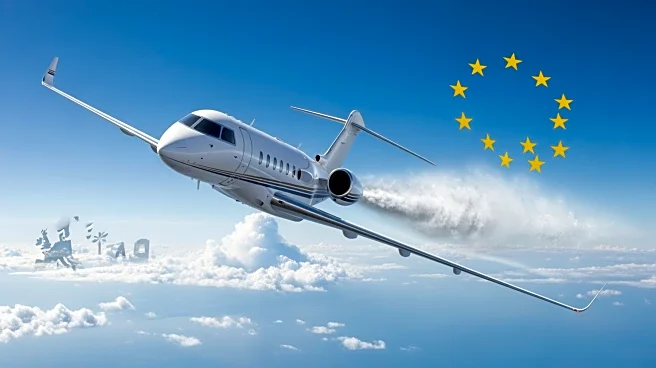What's Happening?
Russian President Vladimir Putin is considering a trip to Budapest to meet with U.S. President Trump, but faces significant logistical challenges due to EU airspace restrictions. Following Russia's full-scale
invasion of Ukraine in February 2022, the EU imposed a ban on Russian aircraft flying through the airspace of its 27 member countries. This ban complicates any potential travel plans for Putin, who would require special dispensation to fly over EU territory. Hungary, a NATO member and one of Putin's closest allies in the EU, is willing to facilitate the visit. However, the route to Hungary is complex, as it involves navigating through or around EU and NATO airspace. The most direct route could involve flying over the Black Sea and through Turkey, Bulgaria, and either Serbia or Romania. Each of these countries would need to individually grant permission for Putin's plane to pass through their airspace.
Why It's Important?
This potential visit underscores the ongoing geopolitical tensions between Russia and the EU, as well as the delicate diplomatic balancing act required to facilitate such high-level meetings. The EU's airspace ban on Russian aircraft is a significant barrier, reflecting broader sanctions and diplomatic isolation imposed on Russia following its actions in Ukraine. The meeting between Putin and President Trump could have implications for international relations, particularly concerning the conflict in Ukraine. Hungary's willingness to host the meeting highlights its unique position within the EU as a close ally of Russia, which could influence EU dynamics and policy decisions. The outcome of this meeting could impact efforts to negotiate peace in Ukraine and shape future EU-Russia relations.
What's Next?
If the meeting proceeds, it will require careful coordination and negotiation with EU member states to secure the necessary airspace permissions. The European Commission has indicated that member states can individually grant derogations to the airspace ban, but this requires consensus and cooperation. The involvement of President Trump may influence EU member states' decisions, as the meeting is framed as a step towards achieving peace in Ukraine. The logistical challenges of Putin's travel could also prompt discussions within NATO and the EU about their current policies and sanctions against Russia. The international community will be closely watching the developments, as the meeting could signal shifts in diplomatic strategies and alliances.









